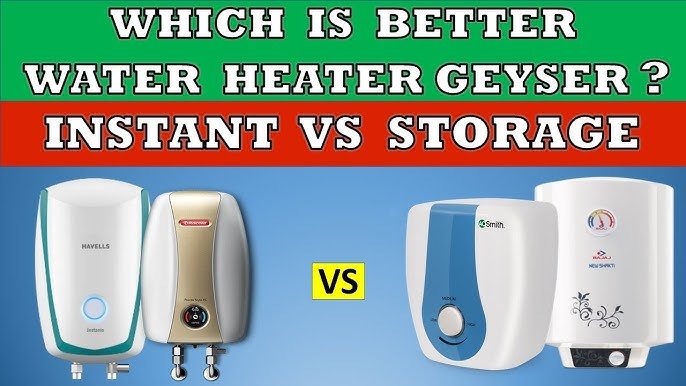Introduction
Choosing the right water heater for your home is more important than you might think. Whether you’re building a new home or replacing an old unit, the decision between an instant water heater and a storage water heater can impact your energy bills, comfort, and overall satisfaction. In this article, we’ll dive deep into both options to help you make an informed choice.
What Is an Instant Water Heater?
An instant water heater, also known as a tankless water heater, heats water on demand. When you turn on the hot water tap, cold water travels through the unit, where it is heated instantly. This type of water heater does not store hot water but provides it whenever you need it.
Pros:
- Energy Efficiency: Only heats water when needed, reducing energy waste.
- Compact Size: Takes up less space, ideal for small homes or apartments.
- Unlimited Hot Water: You’ll never run out of hot water, as it heats water continuously.
Cons:
- Higher Initial Cost: More expensive to purchase and install.
- Flow Rate Limitations: May struggle to supply hot water to multiple outlets simultaneously in large homes.
- Electricity Dependency: If powered by electricity, a power outage means no hot water.
What Is a Storage Water Heater?
A storage water heater, commonly known as a tank water heater, stores a certain amount of hot water in a tank. The water is heated continuously, ensuring that it is ready when you need it.
Pros:
- Lower Initial Cost: Typically less expensive to purchase and install.
- Simplicity: Easier to install and use, with straightforward technology.
- Better for Large Households: Can supply hot water to multiple outlets simultaneously.
Cons:
- Energy Consumption: Continuously heats water, leading to higher energy consumption.
- Space Requirements: Takes up more space due to the storage tank.
- Limited Hot Water Supply: Once the hot water in the tank is used up, you’ll need to wait for it to heat up again.
Energy Efficiency Comparison
When it comes to energy efficiency, instant water heaters generally have the upper hand. Since they only heat water as needed, there’s no standby energy loss, which is common with storage water heaters that keep water hot all the time. Over time, this can lead to significant energy savings, especially if your household doesn’t require constant hot water.
However, the actual savings will depend on your usage patterns. If you have a large household with high hot water demand, the energy savings might be less noticeable.
Cost Analysis
Upfront Costs: Instant water heaters are generally more expensive upfront. The cost of the unit itself, combined with the installation, especially if you need to upgrade your electrical system, can be a deterrent for some homeowners.
Long-term Costs: Despite the higher initial investment, instant water heaters often prove more cost-effective in the long run due to their energy efficiency. Storage water heaters, while cheaper to purchase, can lead to higher energy bills over time.
Space and Installation Requirements
Space Considerations: Instant water heaters are compact and can be installed in small spaces, even mounted on walls. This makes them ideal for homes with limited space. Storage water heaters, on the other hand, require more room due to the tank, making them less suitable for small spaces.
Installation Process: The installation of an instant water heater can be more complex, particularly if your home’s electrical system needs upgrading. Storage water heaters are easier and less expensive to install, making them a popular choice for those on a budget.
Water Heating Speed and Availability
Instant Water Heaters: These heaters provide hot water almost immediately after you turn on the tap, making them ideal for quick, on-demand usage. However, their flow rate might be limited, which means if multiple people are using hot water at the same time, the temperature might drop.
Storage Water Heaters: These heaters store a large amount of hot water, ready to be used at any time. This is beneficial during peak usage times when multiple faucets are in use. However, once the stored hot water is depleted, you’ll need to wait for the tank to refill and reheat.
Suitability for Different Household Sizes
Small Households: For small families or individuals, instant water heaters are often a great choice. Their energy efficiency and space-saving design make them ideal for homes with lower hot water demand.
Large Households: For larger families, a storage water heater might be more practical. Its ability to store and provide large amounts of hot water simultaneously is essential for homes with multiple bathrooms and high hot water usage.
Lifespan and Durability
Instant Water Heaters: These heaters typically last longer, with an average lifespan of 20 years or more. They have fewer parts that can wear out, contributing to their durability.
Storage Water Heaters: These heaters have a shorter lifespan, usually around 10-15 years. The tank is prone to rust and sediment buildup, which can shorten its lifespan.
Safety Features
Instant Water Heaters: Often come with advanced safety features like automatic shut-off, temperature control, and anti-scald protection, reducing the risk of accidents.
Storage Water Heaters: Also come with safety features, such as pressure relief valves and thermostats, but may require more maintenance to ensure these features function correctly.
Environmental Considerations
Carbon Footprint: Instant water heaters tend to have a lower carbon footprint due to their energy efficiency. They are a better choice for environmentally conscious consumers looking to reduce their impact.
Sustainable Options: Both types of heaters have eco-friendly models available, such as those powered by solar energy or featuring high-efficiency ratings.
User Convenience and Comfort
Instant Water Heaters: Offer the convenience of on-demand hot water, perfect for those who value quick and easy access. They are also generally quieter during operation.
Storage Water Heaters: Provide a steady supply of hot water, which can be more comfortable for larger households. However, they may produce more noise, particularly as they age.
Maintenance Requirements
Instant Water Heaters: Require minimal maintenance, primarily involving periodic cleaning of the heating elements to prevent scale buildup.
Storage Water Heaters: Need more frequent maintenance, such as flushing the tank to remove sediment and checking the anode rod to prevent rust.
Common Myths and Misconceptions
Myth 1: Instant Water Heaters Are More Expensive to Run: While the upfront cost is higher, instant water heaters can save you money in the long run due to their energy efficiency.
Myth 2: Storage Water Heaters Are Outdated: While they may seem less advanced, modern storage water heaters are efficient and reliable, especially for large households.
Conclusion
In the battle between instant and storage water heaters, the right choice depends on your specific needs and preferences. If you’re seeking energy efficiency, space-saving design, and long-term cost savings, an instant water heater might be your best bet. Its on-demand hot water capability and compact size make it ideal for smaller homes or apartments with moderate hot water needs. On the other hand, if you have a larger household with higher hot water demands, a storage water heater could be more suitable. Its ability to provide a steady supply of hot water to multiple outlets simultaneously makes it a practical choice for busy households.
Consider your household size, hot water usage, space constraints, and budget when making your decision. Both types have their own set of advantages and drawbacks, so weigh them carefully to find the best fit for your home. Ultimately, choosing the right water heater can enhance your comfort, reduce energy bills, and improve overall efficiency in your household.
FAQs
1. Is an instant water heater more expensive to run than a storage water heater?
No, generally, instant water heaters are more cost-effective in the long run due to their energy efficiency. They only heat water when needed, which reduces standby energy losses associated with storage water heaters.
2. Can I use an instant water heater for a large family?
Yes, but it depends on the unit’s flow rate and capacity. For large families with high hot water needs, ensure the instant water heater you choose can handle simultaneous hot water demands or consider multiple units.
3. What is the average lifespan of a storage water heater?
A storage water heater typically lasts around 10-15 years. Regular maintenance can help extend its lifespan, but the tank’s susceptibility to rust and sediment buildup can limit its durability.
4. Are there eco-friendly water heater options available?
Yes, there are eco-friendly models for both types of water heaters. Look for energy-efficient ratings, solar-powered options, or units with low carbon footprints to minimize environmental impact.
5. How often should I maintain my water heater?
For instant water heaters, periodic cleaning to prevent scale buildup is usually sufficient. Storage water heaters require more frequent maintenance, such as flushing the tank and checking the anode rod to prevent rust.











































